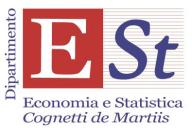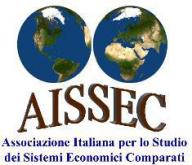By Luca Andriani, Panagiota Makrychoriti, and Emmanouil G. Pyrgiotakis[1]
Reducing carbon emissions is a global challenge, with corporate CO2 emissions being a major contributor to climate change (Hossain et al., 2023). Firms face growing pressure from stakeholders, including banks, customers, investors, and regulators (Kacperczyk and Peydró, 2022; Deng et al., 2023; Azar et al., 2021; Bartram et al., 2022), to adopt pro-climate strategies. However, the limitations of international regulations (Homroy, 2023) necessitate the integration of cultural and social values into corporate decision-making.
Social capital, defined as shared trust, values, and networks that foster cooperative behaviour (Guiso et al., 2011), may drive such strategies by encouraging long-term, community-oriented decisions (Putnam, 1993; Fukuyama, 1995). This forward-looking, community-oriented ethos can encourage firms and decision-makers to prioritize sustainability, making social capital a potential catalyst for climate cooperation. Despite its well-established economic benefits (Knack and Keefer, 1997), the role of social capital in corporate climate behaviour remains underexplored.
This study investigates whether social capital reduces corporate CO2 emissions in emerging economies, focusing on: (i) whether firms in high-social-capital countries emit less, and (ii) whether CEOs from high-social-capital backgrounds influence their firms’ emissions.
Emerging economies, characterized by rapid industrialization and weaker formal institutions, offer a unique context to examine the link between social capital and CO2 emissions. These economies face rising emissions risks as industrial activities grow, with the Asia-Pacific region alone contributing over 50% of global greenhouse gas emissions and driving 80% of coal demand growth. In such settings, cultural values and networks play a critical role in shaping corporate decisions (Cuervo-Cazurra and Genc, 2008; Elango and Pattnaik, 2007).
Analysing 6118 firm-year observations for 1094 firms in emerging markets (2008–2023), we use the Legatum Institute’s Social Capital Index and Refinitiv CO2 emissions data, encompassing both direct (Scope 1) and indirect (Scope 2) emissions. Our findings show a robust negative association between social capital and firm level emissions, with civic and social participation and social networks showing the strongest correlations due to their prosocial nature (Andriani and Christoforou, 2016). These results remain robust across various control variables and fixed-effects models.
We extend our analysis to explore the impact of CEO social capital measured by the social capital score of their country of origin on corporate CO2 emissions. Prior studies highlight the impact of CEO characteristics, including personality, cultural background, and gender, on strategic decision-making and corporate carbon emissions (Gupta et al., 2019; Naeem and Khurram, 2020; Liu et al., 2023; Barroso et al., 2024; Hossain et al., 2023).
Social capital may encourage pro-climate managerial behaviour by fostering cooperation (Putnam, 1993), prioritizing long-term strategies over short-term gains (Anand and Poggi, 2018), and aligning decisions with prosocial values (Bogaert et al., 2008). Our findings confirm a strong negative association between CEO social capital and corporate CO2 emissions.
This relationship is most pronounced for domestic CEOs and diminishes for foreign CEOs unless they originate from countries with stronger social capital than the firm’s host country, where the negative association re-emerges. To address endogeneity, we employ two strategies. First, a two-stage least squares instrumental variable (2SLS IV) regression uses net migration as an instrument (Guiso et al., 2004; Lesage and Ha, 2012). Second, a difference-in-differences (DiD) analysis, inspired by Hossain et al. (2023), leverages CEO replacements as a quasi-natural experiment. Post-replacement, firms with CEOs from high-social-capital countries show significantly lower emissions compared to those that replaced a domestic CEO with another domestic one.
To understand the mechanism, we conduct a channel analysis. Firms with high-social-capital CEOs set ambitious emission reduction targets, signalling genuine commitment rather than slower growth. Subsample analyses show the effect is strongest in firms with low environmental scores, high climate-risk countries, and post-Paris Agreement.
Robustness checks include two-way clustering of standard errors and excluding India and China the largest countries by population from the sample. The results remain consistent across these tests.
This study contributes to the literature on cultural factors and informal institutions in economic and financial development (Guiso et al., 2004; Zingales, 2015), with social capital shown to influence corporate outcomes like innovation, risk-taking, and performance (Gupta et al., 2020; Ferris et al., 2017). Closest to our work, Jha and Cox (2015) link U.S. county-level social capital to corporate social responsibility (CSR) scores.
Our study differs in two critical ways. First, we focus on emerging markets, where weaker institutions, less stringent environmental regulations, and diverse economic conditions uniquely shape the social capital-emissions relationship. Second, unlike CSR scores, which may reflect disclosure rather than actual environmental outcomes (Drempetic et al., 2020; Raghunandan and Rajgopal, 2022), we directly measure firm-level carbon emissions, providing a more precise assessment of environmental performance.
By focusing on carbon emissions in emerging economies, our research advances the understanding of how cultural values and informal institutions influence firms’ climate actions.
[1] Corresponding author: Birkbeck, University of London, Malet St, London WC1E 7HX, United Kingdom









